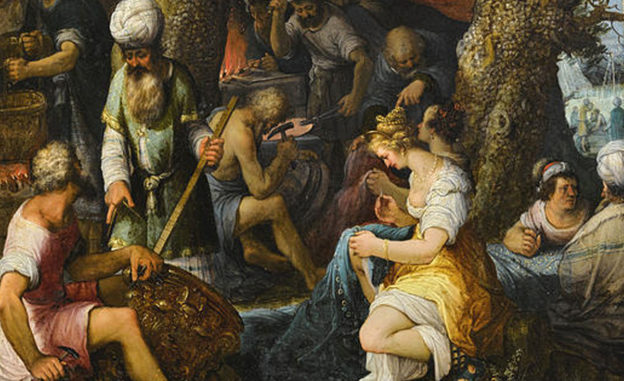Many hands make light work, or so the saying goes. Mind you, too many cooks spoil the broth! Still, it is true that we all have gifts and talents from God for not only our benefit but others’ too, and that is equally true of Kingdom Work as it is of just about any task we need to complete.
In Exodus 35, the narrative shifts from Moses receiving instructions from God on how to live in a way that pleases God (especially after the disastrous Golden Calf incident), to constructing God’s dwelling place with his people – the tabernacle. In our passage, we see that this task was one that all of Israel played a hand in. But not before a reminder that resting in God came before working for his glory.
While it seems repetitious to us with our advanced editing techniques, there is significant repetition of content in Exodus 35 to 39 from earlier in the book. However, the focus shifts from God’s instructions to the People’s constructions.
Just as previous parts of Exodus contained reminders about the Sabbath’s importance, so too does this section. In verses one to three, Moses reminds Israel of the importance of resting from work on the Sabbath, even to the extent of not lighting cooking fires (v.3). Apparently some cultures claimed this was “pre-work”, and it is not hard for a lawyer to argue from the hearth to the metal furnace. God’s command to rest in him was absolute.
So while Israel could not construct on the Sabbath, they could participate in the construction on the other six days of the week. Therefore, Moses commands Israel to begin the construction process.
Moses asked for donations of “gold, silver, and bronze; blue and purple and scarlet yarns and fine twined linen; goats’ hair, tanned rams’ skins, and goatskins; acacia wood, oil for the light, spices for the anointing oil and for the fragrant incense, and onyx stones and stones for setting, for the ephod and for the breastpiece” (vv.6-9).
Not exactly cash, but they were all important materials needed for building the various parts of the tabernacle. They were also, for their day (and even today), expensive items. God could have made it appear with a snap of his proverbial fingers, but instead asked God’s people to give back from what he’d given to make his home with them. Not just from what they had lying around, but from their best.
Secondly, Moses asked for “every skillful craftsman among you [to] come and make all that the Lord has commanded” (v.11). The various things needed required abilities ranging from wood and metalwork to sewing and cabinetry (vv.12-19). While not everyone had those abilities, plenty did. And those that had those abilities were those called to the work.
God’s People, chastened by their sin and relieved by the pardon which God had granted them through Moses’ intercession, leapt into (Sabbath-compliant) action. “Everyone whose heart stirred him, and everyone whose spirit moved him” contributed what God asked to build the tabernacle (vv.20-9).
Two groups receive special attention in the list of contributors. Firstly, skillful women “spun in blue and purple and scarlet yarns and fine twined linen” and “spun the goats’ hair” (vv.25-6). God’s work was not men only; women had an important (and noted) role to play beyond keeping the home fires burning and providing lunch for the hungry labourers.
Secondly, the leaders of Israel, who likely had greater means than those under their lead, made costly contributions of items like the gemstones, spices, and incense for the construction (vv.28-9). To whom much was given, more was required. And the leaders, like all of Israel (v.29), responded by pitching in to the work.
We do not worship at a tabernacle today, but we still have God’s invitation to participate in God’s Kingdom Work. We all have different gifts and abilities which contribute to the Church and its life.
Whether that is a gift for prayer, for service, for teaching and preaching, or encouragement, we all have gifts God has given us. Kingdom Work belongs to all of us, not just the Pastor, not just the Elders and Deacons. All of us.
Secondly, it does not matter whether we are men or women, we have a part to play in the Church. There are a wide range of activities we all can participate in, male or female, that are not limited to kitchen duty and childcare (though if you enjoy that, go for it!). Most of us will not be Elders or Deacons, but that doesn’t limit our contribution.
Thirdly, we can all contribute by giving out of what we have been given financially. For some of us that is more than others, but that is okay! God has given us what we have to steward, and that includes giving back to him.
However, all this work is not done to earn God’s favour, but because we rest in God’s favour. Jesus, the greatest gift, is the great Sabbath rest that enables us to work for God’s glory.

